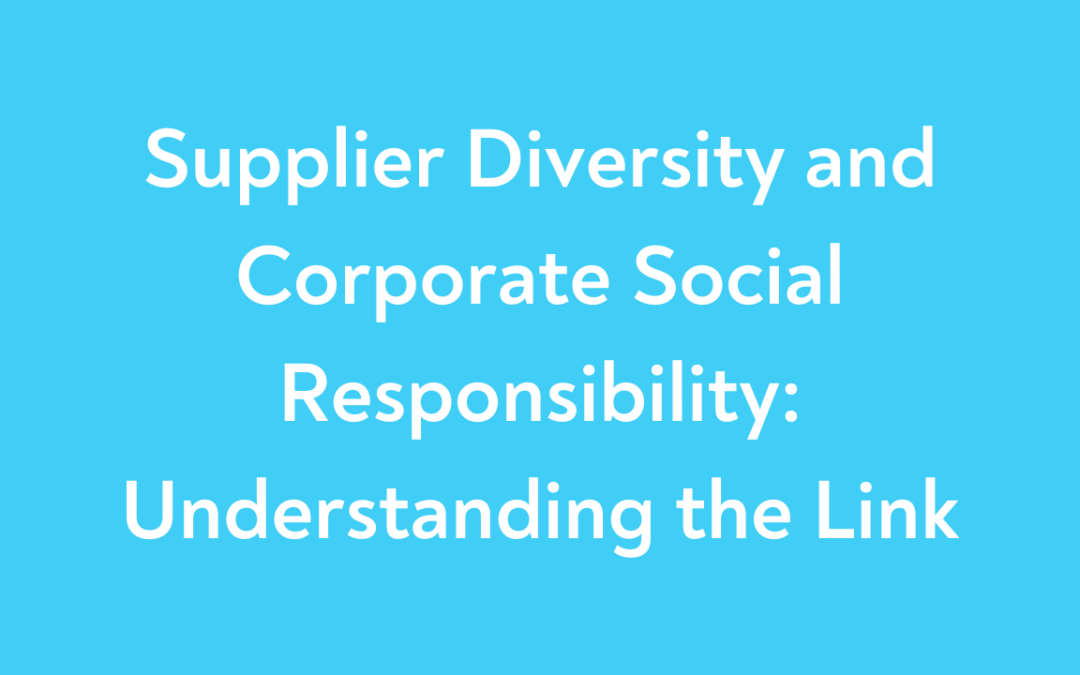Supplier Diversity and Corporate Social Responsibility (CSR) have become hot topics in the modern business world. Though distinct, they are closely intertwined, each contributing to a company’s success and its commitment to fostering an inclusive and equitable future. This article aims to explore this relationship and highlight the deeper implications of supplier diversity and CSR.
Understanding Corporate Social Responsibility (CSR)
CSR is a self-regulating business model that helps companies become socially accountable. It urges companies to be ethically conscious, contribute to economic development, and improve the quality of life for employees, their families, and the local community. CSR is a testament to a company’s commitment to responsible practices that extend beyond profits.
Linking CSR and Supplier Diversity
Supplier diversity intertwines with CSR by advocating for more inclusive procurement strategies. This process involves sourcing goods and services from a wider range of suppliers, including businesses owned by ethnic minorities, women, LGBTQ+ individuals, veterans, and disabled people.
At its core, supplier diversity promotes social justice and equity, crucial elements of CSR. By offering equal opportunities to diverse suppliers, businesses can fuel economic growth in marginalized communities, reduce income disparities, and uphold their social responsibility.
Moreover, robust supplier diversity programs often reflect positively on a company’s reputation, enhancing their image and helping them meet their CSR goals. Companies recognized for their commitment to supplier diversity are seen as leaders in corporate responsibility, strengthening their bonds with customers, employees, and their community.
The Deeper Implications of Supplier Diversity
While the link between supplier diversity and CSR is clear, the impact of supplier diversity transcends this connection. Supplier diversity is not just a social good; it’s a strategic advantage that can significantly contribute to a company’s bottom line.
Diverse suppliers often bring unique perspectives, cost-effective solutions, and local market insights that can enhance a company’s competitiveness. Moreover, a diverse supply base can boost flexibility and resilience, enabling companies to navigate supply chain disruptions more effectively.
Diverse suppliers, particularly smaller businesses and startups, can also offer a significantly positive return on investment (ROI) for large corporations. They often have lower overheads and can provide more competitive pricing. They can also be more agile, providing faster turnaround times and personalized services, which can enhance efficiency and customer satisfaction.
Large Corporations Embracing Supplier Diversity
Several large corporations have successfully transitioned supplier diversity from a CSR initiative to a central focus of their business.
Tech giant Google, for example, has invested heavily in diversifying its supply chain. The company’s supplier diversity program works to connect more minority-, women-, veteran-, and LGBTQIA+-owned small businesses to opportunities within the Google corporation. This initiative goes beyond meeting CSR objectives. It fosters innovation and brings in fresh perspectives, helping Google stay at the forefront of technological advancement.
Another prime example is IBM, which started its supplier diversity program back in 1968. Today, the company spends billions annually with diverse suppliers. This initiative is not just about fulfilling social responsibility; it’s about strategically increasing competitiveness, and fostering sustainable growth.
The automotive industry, too, has seen a substantial focus on supplier diversity. Ford Motor Company, for instance, has been leveraging its supplier diversity program to develop new ideas, reduce costs, and remain relevant in a dynamic industry. In 2020, Ford spent $5.8 billion with minority-owned suppliers, emphasizing the strategic importance of supplier diversity in the company’s everyday operations.
Moving Forward
While CSR and supplier diversity are closely linked, the importance of supplier diversity stretches far beyond CSR, becoming a strategic business initiative. At Hire Ground, we champion supplier diversity, seeing it not just as part of CSR, but as a key approach to business growth and success.
While supplier diversity complements CSR, it is much more than a mere social initiative. It is a necessary endeavor that brings about diversity of thought, spurs innovation, and drives business success, ultimately leading to a more inclusive future for the modern marketplace.
Key Takeaways:
- CSR and supplier diversity are intertwined, both focusing on social accountability, economic development, and improving the quality of life for stakeholders.
- Beyond CSR, supplier diversity provides strategic business advantages like fostering innovation, enhancing resilience, and promoting cost savings.
- Several large corporations, like Google, IBM, and Ford Motor Company, have successfully transitioned supplier diversity from a CSR initiative to a central business strategy, fueling competitiveness and sustainable growth.
- Embracing supplier diversity is about committing to creating a more equitable future, providing opportunities to historically marginalized groups, and going above and beyond mere CSR objectives.


Recent Comments